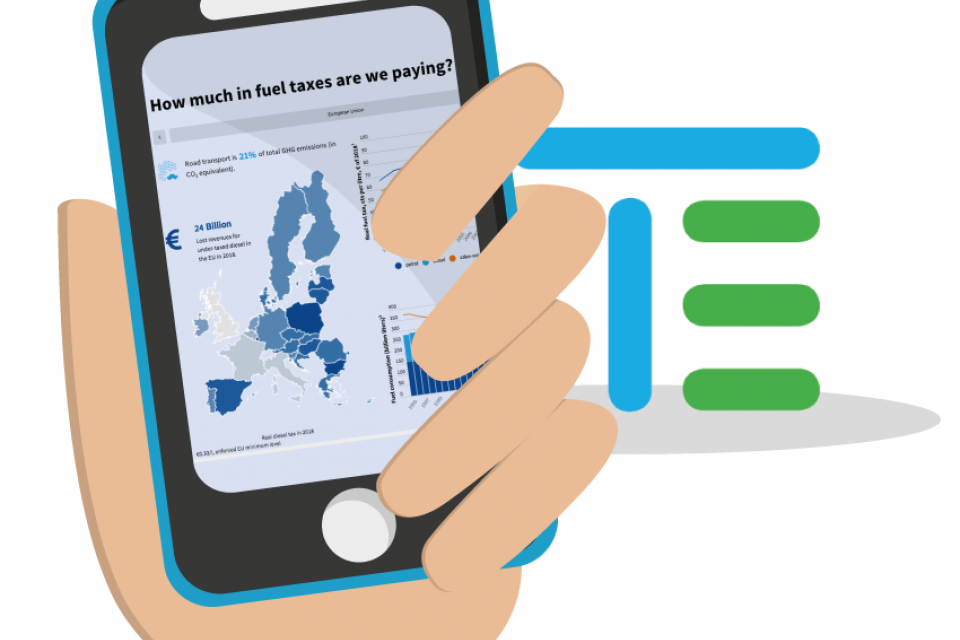Fuel tax rates lag badly behind environmental reality
There are still massive differences in the taxation of petrol and diesel across Europe, with many countries still favouring diesel despite its major contribution to air pollution. Exactly which countries favour diesel and by how much is revealed in a new T&E interactive tax tool, which itemises the discrepancy in fuel tax and calculates how much money governments are losing.
Diesel taxes have historically been low as part of efforts to help road haulage, but in the 1990s, the fuel efficiency advantage that diesel enjoyed over petrol in cars led many finance ministers to tax diesel less than petrol. Petrol had the advantage over diesel on contributions to air pollution, but the fight against climate change meant diesel vehicles were encouraged because they burned less fuel. Yet in the following two decades, diesel continued to contribute to serious levels of air pollution, while petrol caught up on fuel efficiency, thereby wiping out the justification for favourable rates of tax on diesel.
Despite this, tax rates have not caught up with environmental reality, as T&E’s interactive tax tool confirms. Only two EU states – the UK and Belgium – tax petrol and diesel the same, with all the rest giving diesel an advantage. T&E calculates this is costing European governments €24 billion in lost tax revenue every year.
The tax tool is a live map of Europe, allowing users to move their cursor over the various countries, at which point it highlights the level of diesel tax in 2018, the discrepancy between petrol and diesel, and what any discrepancy is costing the country in lost revenue. For example, scrolling the cursor over Germany shows diesel tax was €0.47 per litre in 2018, €0.18 cheaper than petrol tax, which led to a shortfall in revenue of €7.3 billion. By contrast, the cursor over Belgium shows a discrepancy of just three cents in 2018, making the shortfall €225 million, but even this has now been eliminated as Belgium has equalised the two rates of tax.
By contrast, Spain loses €2.4 billion every year. T&E’s manager for Spain, Isabell Büschell, said: ‘Equalling taxes on petrol and diesel would not only put an end to the unjustified tax reduction applicable to diesel, but would also allow the Spanish state to fill almost half of its €6 billion hole in the national budget, as well as respond to repeated calls from the OECD and the European Commission for environmental tax reform.
by Eoin Bannon
Source: https://www.transportenvironment.org
FLEET MANAGEMENT AUDIT
Fleet management is the use of a set of vehicles in order to provide services to a third-party, or to perform a task for our organization, in the most efficient and productive manner with a determined level of service and cost.
Fleet management activities are shown in the following graph 1:

Graph 1: fleet management activities
The proposal audit analyses and assesses all fleet management activities shown in the graph 1, and its main goals are:
- Know the overall status of the fleet management activities
- Provide the analysis, the assessment, the advice, the suggestions and the actions to take in order to cut costs and increase the efficiency and efficacy of the fleet management activities
With the information obtained, we’ll elaborate a report that holds the overall status of the fleet management as well as the suggestions, recommendations and the measures to take in order to cut costs and optimize the fleet management activities.
CLICK ON THE FOLLOWING LINK TO DOWNLOAD THE PROPOSED FLEET MANAGEMENT AUDIT:
Fleet Management Audit AFMC
Contact:
José Miguel Fernández Gómez
34 678254874
info@advancedfleetmanagementconsulting.com



